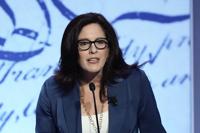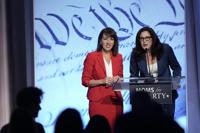6 Moms for Liberty protesters arrested on final day of the group’s Philly summit
Five people arrested were holding hands while standing in the middle of the intersection at 12th and Filbert Streets, and a sixth was a trans woman waving a flag, according to ACT UP Philadelphia.
/cloudfront-us-east-1.images.arcpublishing.com/pmn/VRALKNG5JNHNVKKWVMEDDVCPAM.JPG)
Philadelphia police arrested five Moms for Liberty protesters for blocking traffic outside the Philadelphia Marriott Downtown Sunday morning.
Courtesy of Nico Wisler
by Maddie Hanna
Updated on Jul 2, 2023
Five Moms for Liberty protesters were arrested Sunday morning for blocking traffic outside the Philadelphia Marriott Downtown, and a sixth for waving a flag over a barricade set up outside the hotel, according to activists.
Philadelphia police said the six people were arrested on charges of failure to disperse, but did not provide further details. ACT UP Philadelphia, the AIDS activism group, provided photographs of five people, who were holding hands while standing in the middle of the intersection at 12th and Filbert Streets.
“They were chanting for Moms for Liberty to go home and blocking traffic,” said Aaron Bodiford, an activist with the group. He said police gave the activists three warnings before making the arrests, pulling their vans up in front of the barricades where the rest of the protesters were stationed.
/cloudfront-us-east-1.images.arcpublishing.com/pmn/I47NOYUYQZAMNN3CIJ2XYNN2SI.JPG)
Five Moms for Liberty protesters were arrested Sunday morning for blocking traffic outside the Philadelphia Marriott Downtown, and a sixth for waving a flag over a barricade set up outside the hotel, according to activists.
Philadelphia police said the six people were arrested on charges of failure to disperse, but did not provide further details. ACT UP Philadelphia, the AIDS activism group, provided photographs of five people, who were holding hands while standing in the middle of the intersection at 12th and Filbert Streets.
“They were chanting for Moms for Liberty to go home and blocking traffic,” said Aaron Bodiford, an activist with the group. He said police gave the activists three warnings before making the arrests, pulling their vans up in front of the barricades where the rest of the protesters were stationed.
/cloudfront-us-east-1.images.arcpublishing.com/pmn/I47NOYUYQZAMNN3CIJ2XYNN2SI.JPG)
Philadelphia police arrested five Moms for Liberty protesters for blocking traffic outside the Philadelphia Marriott Downtown Sunday morning.
Courtesy of Nico Wisler
Later Sunday, Bodiford said a trans woman was also arrested for waving a trans flag over the barricade set up around the Marriott.
The arrests came on the fourth and final day of the summit for the controversial “parental rights” group, which targets LGBTQ issues and diversity education and has drawn protests since its arrival in Philadelphia Thursday. The event, attended by 650 people from across the country, featured speeches from former President Donald Trump and Florida Gov. Ron DeSantis, among other Republican presidential contenders.
Sunday’s program included North Carolina Lt. Gov. Mark Robinson, a GOP candidate for governor who has said “there’s no reason anybody anywhere in America should be telling any child about transgenderism, homosexuality, any of that filth”; and KrisAnne Hall, a self-described “constitutional attorney” who has previously addressed the Oath Keepers militia group.
The summit contained a heavy focus on opposing transgender identity and gender transitioning — messages not lost on protesters, who throughout the conference have been waving Pride flags and chanting “Philly is a trans city” and “Philly is a queer city.”
/cloudfront-us-east-1.images.arcpublishing.com/pmn/MZ72P67B4ZCFVAKHCGAP5Q7V6A.JPG)
Later Sunday, Bodiford said a trans woman was also arrested for waving a trans flag over the barricade set up around the Marriott.
The arrests came on the fourth and final day of the summit for the controversial “parental rights” group, which targets LGBTQ issues and diversity education and has drawn protests since its arrival in Philadelphia Thursday. The event, attended by 650 people from across the country, featured speeches from former President Donald Trump and Florida Gov. Ron DeSantis, among other Republican presidential contenders.
Sunday’s program included North Carolina Lt. Gov. Mark Robinson, a GOP candidate for governor who has said “there’s no reason anybody anywhere in America should be telling any child about transgenderism, homosexuality, any of that filth”; and KrisAnne Hall, a self-described “constitutional attorney” who has previously addressed the Oath Keepers militia group.
The summit contained a heavy focus on opposing transgender identity and gender transitioning — messages not lost on protesters, who throughout the conference have been waving Pride flags and chanting “Philly is a trans city” and “Philly is a queer city.”
/cloudfront-us-east-1.images.arcpublishing.com/pmn/MZ72P67B4ZCFVAKHCGAP5Q7V6A.JPG)
Philadelphia police arrested five Moms for Liberty protesters for blocking traffic outside the Philadelphia Marriott Downtown Sunday morning.
Courtesy of Nico Wisler
Police have been stationed at the protests, which started Thursday outside the Marriott and the Museum of the American Revolution as it hosted a welcome reception for Moms for Liberty that night over outcry from its staff. While some interactions have been tense — police threatened to arrest anyone who blocked traffic Thursday night — only one arrest had been reported before Sunday.
Saturday’s protests were family-oriented, with children drawing on the street with chalk and decorating signs during a daylong dance party. Bodiford said activists hadn’t wanted to risk arrests of families.
As the dance party resumed Sunday, Bodiford said protesters wanted to send a message.
“We are willing to take things further than we have been,” he said from outside the Marriott, where Moms attendees were trickling out as the summit ended. “It’s actually not on their terms. It’s on our terms.”
Police have been stationed at the protests, which started Thursday outside the Marriott and the Museum of the American Revolution as it hosted a welcome reception for Moms for Liberty that night over outcry from its staff. While some interactions have been tense — police threatened to arrest anyone who blocked traffic Thursday night — only one arrest had been reported before Sunday.
Saturday’s protests were family-oriented, with children drawing on the street with chalk and decorating signs during a daylong dance party. Bodiford said activists hadn’t wanted to risk arrests of families.
As the dance party resumed Sunday, Bodiford said protesters wanted to send a message.
“We are willing to take things further than we have been,” he said from outside the Marriott, where Moms attendees were trickling out as the summit ended. “It’s actually not on their terms. It’s on our terms.”
Shame Went to Die at Moms for Liberty’s Philadelphia Summit
Jared Holt
Jared Holt
The Daily Beast.
Sat, July 1, 2023

Michael M Santiago/GettyImages
In another era of politics, Republican presidential hopefuls may have hesitated before hitching their brands to an organization whose members have harassed and threatened opponents, fantasized about enacting gun violence, mingled with known extremist groups, quoted Nazi leader Adolf Hitler in their materials, and earned a designation as an anti-government extremist group. It’s safe to say that time is long gone.
Five 2024 candidates traveled to the birthplace of the United States to take turns auditioning for the support of a sold-out crowd of Moms for Liberty activists and rhetorically kissing the rings of the group’s co-founders, former school board members Tina Descovich and Tiffany Justice, at their “Joyful Warriors” conference in Philadelphia this week.
It’s little surprise; Moms for Liberty has emerged as a juggernaut in the conservative movement since its inception two years ago. The group claims to fight for “parental rights at all levels of government,” but it’s better known for what it opposes: COVID-19 health precautions, the contents of school libraries, and educational curricula that feature lessons about race, sexuality, and gender. Moms for Liberty has ridden its successes into statehouses across the country, where it hopes to help push anti-LGBTQ bills into law.
The Southern Poverty Law Center added Moms for Liberty to its database of extremist groups last month: a move swiftly rejected by the group as a “political hit job” and frowned upon by many of the group’s conservative media allies. For many speakers, including presidential candidates, that extremist group designation was acknowledged via a punchline.
“I’m telling you these people are sick,” former President Donald Trump said, earning laughter from the audience. “Moms for Liberty is no hate group… You’re the best thing that’s ever happened to America.”
The America First Political Action Conference Is Courting Republicans Towards Extremism
Even Nikki Haley, a relative moderate in the current slate of Republican candidates, shrugged off the group’s scandals.
“When they mentioned that this was a terrorist organization, I said, ‘Well, then count me as a Mom for Liberty,’” Haley proclaimed to the sold-out crowd. She was met with roaring applause.
Florida Gov. Ron DeSantis told Moms for Liberty that scrutiny of the group was “a sign that we are winning this fight.”
Ryan Walters, the Oklahoma superintendent of public instruction who has called teachers’ unions “terrorist organizations” and is facing fallout for his handling of federal funds, took his pushback a step further.
“You know who else was called a terrorist group, an extremist group?” Walters rhetorically asked. “Those founding fathers. That’s who you are today. You are the most patriotic, pro-America group in the country right now.”
It’s clear that the SPLC’s extremist group designation struck a chord at Moms for Liberty. The joking candor shifted briefly before Trump spoke on Friday, when co-founder Justice teased that her group would be exploring retribution, hinting at possible legal action, against its opponents and critics.
But even with that scrutiny in front of mind, Moms for Liberty made no apparent effort to tamp down on the kinds of extreme rhetoric and far-right affiliations that earned its spot on SPLC’s list to begin with. Even a passing glance at the event’s speakers lineup reveals a wash of far-right ideologues.
One featured speaker was KrisAnne Hall, who has espoused far-right rhetoric and affiliated with less-debatable extremist groups like the anti-government Oath Keepers and neo-Confederate League of the South. Others include James Lindsay, an anti-LGBTQ social media performer who has described the Pride flag as that “of a hostile enemy” and North Carolina Lt. Gov. Mark Robinson, an unabashed Christian nationalist who has declared the transgender rights movement “demonic” and “full of the Antichrist spirit.” Many speakers have publicly accused teachers and officials who promote LGBTQ inclusion in schools of grooming children for sexual exploitation—incendiary rhetoric that has undergirded surges in anti-LGBTQ threats in the US.
That sort of sentiment was mirrored by DeSantis, who maintains a fandom within Moms for Liberty, and the other presidential hopefuls, too. At one point in DeSantis’ speech, he declared that gender-affirming care for transgender youth was “wrong” and “has no place in our society.”
Haley accused transgender rights advocates of “trying to erase” the progress of women in America. Audible groans of disgust could be heard from audience members when Trump bemoaned parents who take their children to drag shows.
The incendiary rhetoric directed toward LGBTQ people and their advocates on stage was certainly hateful, but it also serves to justify a host of behaviors and policies that don’t actually help parents or their children. It also works to cast Republicans’ political opponents not just as people who disagree but as immoral villains who must be defeated by any means necessary, let alone compromised with.
Trump’s Gone Full QAnon. There’s No Point in Denying It Anymore.
The establishment conservative movement has long sought to undermine public education, and some of its biggest players have predictably rushed to support Moms for Liberty and groups like it. Its founders have discovered allies in a host of conservative movement groups with large bases of support and dollars. Heritage Foundation and Liberty Institute, two of the most powerful and well-funded think tanks in Washington, sponsored Moms for Liberty’s summit this year.
If you believe Trump, all of this debasement is in service of fighting “a cult” of “Marxists and perverts” who are pushing a “poison” of gender ideology on children. Those who believe DeSantis might think of themselves like those who battled for a democratic Berlin after World War II. Whatever it might be, to the true believer, it must be better than the child abuse Democrats supposedly hope to normalize.
The only viable currency in the modern Republican Party is raw power: a fact made self-evident in presidential candidates’ appearances at the Moms for Liberty summit. In their run to the top of the ticket, these Republican candidates have also submitted to a race to the bottom of a barrel, where shame is a benchable injury.
Sat, July 1, 2023

Michael M Santiago/GettyImages
In another era of politics, Republican presidential hopefuls may have hesitated before hitching their brands to an organization whose members have harassed and threatened opponents, fantasized about enacting gun violence, mingled with known extremist groups, quoted Nazi leader Adolf Hitler in their materials, and earned a designation as an anti-government extremist group. It’s safe to say that time is long gone.
Five 2024 candidates traveled to the birthplace of the United States to take turns auditioning for the support of a sold-out crowd of Moms for Liberty activists and rhetorically kissing the rings of the group’s co-founders, former school board members Tina Descovich and Tiffany Justice, at their “Joyful Warriors” conference in Philadelphia this week.
It’s little surprise; Moms for Liberty has emerged as a juggernaut in the conservative movement since its inception two years ago. The group claims to fight for “parental rights at all levels of government,” but it’s better known for what it opposes: COVID-19 health precautions, the contents of school libraries, and educational curricula that feature lessons about race, sexuality, and gender. Moms for Liberty has ridden its successes into statehouses across the country, where it hopes to help push anti-LGBTQ bills into law.
The Southern Poverty Law Center added Moms for Liberty to its database of extremist groups last month: a move swiftly rejected by the group as a “political hit job” and frowned upon by many of the group’s conservative media allies. For many speakers, including presidential candidates, that extremist group designation was acknowledged via a punchline.
“I’m telling you these people are sick,” former President Donald Trump said, earning laughter from the audience. “Moms for Liberty is no hate group… You’re the best thing that’s ever happened to America.”
The America First Political Action Conference Is Courting Republicans Towards Extremism
Even Nikki Haley, a relative moderate in the current slate of Republican candidates, shrugged off the group’s scandals.
“When they mentioned that this was a terrorist organization, I said, ‘Well, then count me as a Mom for Liberty,’” Haley proclaimed to the sold-out crowd. She was met with roaring applause.
Florida Gov. Ron DeSantis told Moms for Liberty that scrutiny of the group was “a sign that we are winning this fight.”
Ryan Walters, the Oklahoma superintendent of public instruction who has called teachers’ unions “terrorist organizations” and is facing fallout for his handling of federal funds, took his pushback a step further.
“You know who else was called a terrorist group, an extremist group?” Walters rhetorically asked. “Those founding fathers. That’s who you are today. You are the most patriotic, pro-America group in the country right now.”
It’s clear that the SPLC’s extremist group designation struck a chord at Moms for Liberty. The joking candor shifted briefly before Trump spoke on Friday, when co-founder Justice teased that her group would be exploring retribution, hinting at possible legal action, against its opponents and critics.
But even with that scrutiny in front of mind, Moms for Liberty made no apparent effort to tamp down on the kinds of extreme rhetoric and far-right affiliations that earned its spot on SPLC’s list to begin with. Even a passing glance at the event’s speakers lineup reveals a wash of far-right ideologues.
One featured speaker was KrisAnne Hall, who has espoused far-right rhetoric and affiliated with less-debatable extremist groups like the anti-government Oath Keepers and neo-Confederate League of the South. Others include James Lindsay, an anti-LGBTQ social media performer who has described the Pride flag as that “of a hostile enemy” and North Carolina Lt. Gov. Mark Robinson, an unabashed Christian nationalist who has declared the transgender rights movement “demonic” and “full of the Antichrist spirit.” Many speakers have publicly accused teachers and officials who promote LGBTQ inclusion in schools of grooming children for sexual exploitation—incendiary rhetoric that has undergirded surges in anti-LGBTQ threats in the US.
That sort of sentiment was mirrored by DeSantis, who maintains a fandom within Moms for Liberty, and the other presidential hopefuls, too. At one point in DeSantis’ speech, he declared that gender-affirming care for transgender youth was “wrong” and “has no place in our society.”
Haley accused transgender rights advocates of “trying to erase” the progress of women in America. Audible groans of disgust could be heard from audience members when Trump bemoaned parents who take their children to drag shows.
The incendiary rhetoric directed toward LGBTQ people and their advocates on stage was certainly hateful, but it also serves to justify a host of behaviors and policies that don’t actually help parents or their children. It also works to cast Republicans’ political opponents not just as people who disagree but as immoral villains who must be defeated by any means necessary, let alone compromised with.
Trump’s Gone Full QAnon. There’s No Point in Denying It Anymore.
The establishment conservative movement has long sought to undermine public education, and some of its biggest players have predictably rushed to support Moms for Liberty and groups like it. Its founders have discovered allies in a host of conservative movement groups with large bases of support and dollars. Heritage Foundation and Liberty Institute, two of the most powerful and well-funded think tanks in Washington, sponsored Moms for Liberty’s summit this year.
If you believe Trump, all of this debasement is in service of fighting “a cult” of “Marxists and perverts” who are pushing a “poison” of gender ideology on children. Those who believe DeSantis might think of themselves like those who battled for a democratic Berlin after World War II. Whatever it might be, to the true believer, it must be better than the child abuse Democrats supposedly hope to normalize.
The only viable currency in the modern Republican Party is raw power: a fact made self-evident in presidential candidates’ appearances at the Moms for Liberty summit. In their run to the top of the ticket, these Republican candidates have also submitted to a race to the bottom of a barrel, where shame is a benchable injury.
Moms for Liberty’s focus on school races nationwide sets up political clash with teachers unions
PHILADELPHIA (AP) — Moms for Liberty, a “parental rights” group that has sought to take over school boards in multiple states, is looking to expand those efforts across the country and to other education posts in 2024 and beyond. The effort is setting up a clash with teachers unions and others on the left who view the group as a toxic presence in public schools.
By Ali Swenson The Associated Press
Sunday, July 2, 2023

Matt Rourke / AP Photo
Moms for Liberty co-founders Tiffany Justice speaks at their meeting, in Philadelphia, Friday, June 30, 2023.

PHILADELPHIA (AP) — Moms for Liberty, a “parental rights” group that has sought to take over school boards in multiple states, is looking to expand those efforts across the country and to other education posts in 2024 and beyond. The effort is setting up a clash with teachers unions and others on the left who view the group as a toxic presence in public schools.
The group’s co-founder, Tiffany Justice, said during its annual summit over the weekend in Philadelphia that Moms for Liberty will use its political action committee next year to engage in school board races nationwide. It also will “start endorsing at the state board level and elected superintendents.”
Her comments confirm that Moms for Liberty, which has spent its first two years inflaming school board meetings with aggressive complaints about instruction on systemic racism and gender identity in the classroom, is developing a larger strategy to overhaul education infrastructure across the country.
As the group has amassed widespread conservative support and donor funding, its focus on education ensures that even as voters turn their attention to the 2024 presidential race, school board elections will remain some of the most contentious political fights next year.
Moms for Liberty started with three Florida moms fighting COVID-19 restrictions in 2021. It has quickly ascended as a national player in Republican politics, helped along the way by the board’s political training and close relationships with high-profile GOP groups and lawmakers. The group’s support for school choice and the “fundamental rights of parents” to direct their children’s education has drawn allies such as Florida Gov. Ron DeSantis, a leading GOP presidential contender, and the conservative Heritage Foundation.
The group has been labeled an “extremist” organization by the Southern Poverty Law Center for allegedly harassing community members, advancing anti-LGBTQ+ misinformation and fighting to scrub diverse and inclusive material from lesson plans.
Justice said in an interview that she and her co-founder, Tina Descovich, were two moms who “had faith in American parents to take back the public education system in America” and that they “fully intend on reclaiming and reforming“ that system.
So far, the group has had mixed success at getting its preferred candidates elected. In 2022, slightly more than half of the 500 school board candidates it endorsed across the country won. In the spring of 2023, fewer than one-third of the nearly 30 candidates it endorsed in Wisconsin were elected.
Focusing on state-level candidates could give Moms for Liberty an opportunity to assert its influence on some of the positions that have more control in determining curriculum, said Jon Valant, a senior fellow at the Brookings Institution who has studied education policy.
A close partnership with the conservative training organization the Leadership Institute and added money from a growing donor base also could help the Moms for Liberty run more electable candidates and help them win in 2024.
Monty Floyd, vice chair of the Moms for Liberty chapter in Hernando County, Florida, knows what it’s like to have the group’s support in a political campaign. He ran for school board in 2022 and received the group’s endorsement, as well as $250 from its Florida-based PAC.
Floyd lost that race but plans to run again in 2026, he told The Associated Press at the summit. He looks forward to seeing how the group’s political influence grows and said that even more than the money, the national network of Moms for Liberty provides a “great resource” to a candidate.
“The wealth of knowledge they have and the network of support and just the advocacy tips that we’re learning from the speakers today,” he said. “They have good advice to give. So you kind of learn a lot about what you can improve in your messaging.”
Moms for Liberty may face obstacles, however, as its rising national presence has driven a countermovement of activists who oppose it, Valant said.
Randi Weingarten, president of the American Federation of Teachers, said she thinks groups such as Moms for Liberty have “created more action and more energy” among teachers unions.
“We have 41 new units that we have organized as the AFT this year. We’ve never had that,” she said. She said the union would “do what we have to do” during elections to show the contrast between its endorsed candidates and Moms for Liberty candidates.
Beyond unions, Moms for Liberty is likely to face opposition from grassroots groups and voters who “just don’t agree with their vision of what public education should be,” Valant said.
Martha Cooney, a Pennsylvania educator who was one of about 100 protesters dancing and holding signs outside the summit Saturday afternoon, agreed. She said that as Moms for Liberty tries to assert more political power, she and others will continue to stand in its way.
“They are a very small minority who are trying to act like they represent this whole nation, and they do not,” Cooney said.
Moms for Liberty did not answer questions on which races it would focus on in 2024, besides making it clear that it would not endorse in legislative races or the presidential election.
But even as the group says it will not get involved in the White House race, Republican candidates have tried to harness Moms for Liberty’s influence and broad network of more than 120,000 members in 45 states to woo its voting bloc and benefit their primary campaigns.
Five GOP candidates gave speeches during the gathering in Philadelphia, which ended Sunday. They included DeSantis and former President Donald Trump. The rivals tried to outflank each other with claims that “woke ideology” had overtaken education and that pronouns and “critical race theory” needed to be struck from classrooms.
“I think moms are the key political force for this 2024 cycle,” DeSantis said in his address to attendees Friday.
Other Republican presidential candidates who appeared at the summit included former U.N. Ambassador Nikki Haley, former Arkansas Gov. Asa Hutchinson and biotech entrepreneur Vivek Ramaswamy, who brought his wife and two children to the stage Saturday. He pledged to prioritize parents’ rights and shutter the U.S. Department of Education if elected.
“The membership of this organization is just a small tip of the iceberg of a broader pro-parent movement, pro-children movement in our country,” Ramaswamy told reporters at the summit. “And so how important is that? You better believe it’s pretty darn important.”
___
The Associated Press receives support from several private foundations to enhance its explanatory coverage of elections and democracy. See more about AP’s democracy initiative here. The AP is solely responsible for all content












